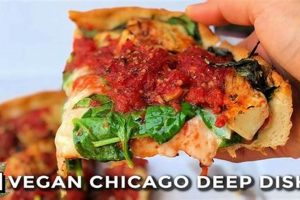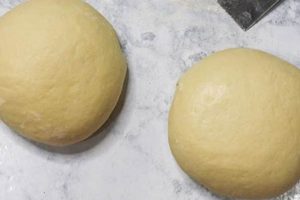The availability of plant-based options at Papa John’s is a common query among individuals adhering to vegan dietary restrictions. Specifically, understanding if the pizza chain offers choices that exclude all animal products, including meat, dairy, and eggs, is essential for vegan customers.
Catering to diverse dietary needs can broaden a restaurant’s customer base and align with growing trends towards plant-based eating. The presence, or absence, of suitable menu items reflects a company’s responsiveness to consumer demand and its commitment to inclusivity. Historically, mainstream pizza chains have been slower to adopt vegan alternatives, but evolving market pressures have encouraged exploration of such options.
This article will delve into the current state of Papa John’s menu, identifying existing plant-based ingredients and examining potential pizza combinations suitable for vegan consumption. Further exploration will include any certified vegan menu items and future possibilities regarding vegan offerings at Papa John’s.
For individuals seeking plant-based meals, understanding how to construct a vegan pizza at Papa John’s requires careful consideration of ingredients and preparation.
Tip 1: Crust Selection: Confirm that the desired crust does not contain dairy or eggs. Inquire directly with the store regarding the precise ingredients used, as formulations may vary regionally or change over time.
Tip 2: Sauce Verification: Opt for the original sauce. Check that the ingredients are free of animal products. Some sauces may contain hidden dairy derivatives.
Tip 3: Cheese Alternatives: As of the current date, Papa John’s does not typically offer vegan cheese as a standard menu item. Consider ordering the pizza without cheese and adding plant-based cheese at home, if desired.
Tip 4: Vegetable Toppings: Select from the wide array of vegetable toppings available, such as mushrooms, onions, peppers, tomatoes, spinach, and olives. Verify that these toppings are not prepared with any animal-derived oils or flavorings.
Tip 5: Oil Application: Request that the pizza be prepared without butter or cheese oil being applied to the crust. This is a common practice that would negate the vegan nature of the meal.
Tip 6: Online Ordering Customization: When ordering online, utilize the customization options to remove non-vegan ingredients. Double-check the order confirmation to ensure accuracy.
Tip 7: Contacting the Store: For complex orders or uncertainties, contacting the specific Papa John’s location directly can clarify ingredient information and preparation methods. Document the conversation for future reference.
By carefully selecting ingredients and communicating specific requirements to the restaurant staff, it is possible to create a pizza that aligns with vegan dietary guidelines. However, cross-contamination during food preparation is a possibility to be aware of.
The following sections will further investigate specific menu items and potential future developments concerning vegan options at Papa John’s.
1. Crust Ingredients
The composition of the pizza crust at Papa John’s directly impacts the availability of vegan pizza options. If the crust contains animal-derived ingredients such as dairy (whey, casein) or eggs, it automatically disqualifies the entire pizza from being considered vegan. Therefore, the first crucial step in determining if Papa John’s offers a vegan pizza involves verifying the crust ingredients.
For example, if Papa John’s were to offer a crust made solely from flour, water, yeast, oil, and salt, then a vegan pizza becomes theoretically possible. However, if the crust recipe includes ingredients such as milk powder or honey, it would preclude the creation of a truly vegan pizza using that crust. The composition of the crust is the foundational element upon which all other vegan considerations are built. Specific regional variations in crust recipes may also exist, adding another layer of complexity in assessing vegan suitability.
In conclusion, the critical role of crust ingredients in determining vegan pizza availability necessitates explicit clarification from Papa John’s regarding their crust formulations. Transparency in ingredient listings, and the potential offering of a dedicated vegan crust, would significantly affect the feasibility of consuming a completely plant-based pizza at their establishments.
2. Sauce Composition
The composition of pizza sauce is a critical factor in determining whether Papa John’s offers a truly plant-based pizza. Although often overlooked, seemingly simple ingredients can harbor animal-derived components, thereby negating the vegan status of an otherwise plant-forward pizza.
- Hidden Animal Derivatives
Many commercially prepared sauces incorporate animal-based ingredients such as whey, casein, or honey as flavor enhancers or preservatives. The presence of these seemingly innocuous components renders the sauce unsuitable for strict vegan diets. Even trace amounts can be problematic for individuals with ethical or allergenic sensitivities.
- Processed Sugar Concerns
The sugar used in some pizza sauces may be processed using bone char, a decolorizing filter made from animal bones. While the sugar itself does not contain bone char particles, the use of this processing method can be a concern for vegans. Determining whether the sugar used in Papa John’s pizza sauce undergoes this process requires direct inquiry with the company.
- Oil Considerations
The type of oil used in the pizza sauce can also be relevant. While most pizza sauces employ vegetable oils like soybean or olive oil, it is essential to confirm that no animal fats, such as lard or tallow, are incorporated, either intentionally or through cross-contamination during production.
- Vegan Certification and Ingredient Transparency
The presence of vegan certification on a pizza sauce provides assurance that it meets established vegan standards. However, in the absence of certification, thorough ingredient list examination and direct communication with Papa John’s regarding sourcing and processing are crucial steps in verifying the sauce’s vegan compatibility. Ingredient transparency builds trust and enables informed consumer choices.
In summary, the ostensibly straightforward component of pizza sauce necessitates careful scrutiny to ascertain its true vegan nature. Hidden animal derivatives, the potential use of bone char-processed sugar, and oil composition all contribute to the complexity of determining whether a Papa John’s pizza can be genuinely plant-based. Ultimately, proactive ingredient verification and transparency on the part of the restaurant chain are essential for satisfying vegan dietary requirements.
3. Cheese Alternatives
The availability of suitable cheese alternatives is a primary determinant of whether Papa John’s can effectively offer vegan pizza. Traditional pizza relies heavily on dairy-based cheese, and the absence of a palatable and functional plant-based substitute presents a significant challenge in catering to vegan consumers.
- Ingredient Composition and Functionality
Vegan cheese alternatives are typically formulated from plant-based sources, such as soy, nuts, seeds, or vegetable oils. Achieving a product that melts, stretches, and browns in a manner similar to dairy cheese is a technological challenge. Many existing vegan cheeses struggle to replicate the texture and flavor profile expected by pizza consumers, which can impact the overall satisfaction with a vegan pizza offering.
- Cost and Supply Chain Considerations
Vegan cheese alternatives often come at a higher cost compared to traditional dairy cheese. This price difference can affect the overall cost of a vegan pizza, potentially making it less accessible to price-sensitive consumers. Furthermore, establishing a reliable supply chain for vegan cheese can be a logistical hurdle for a large pizza chain like Papa John’s, ensuring consistent availability across all locations.
- Customer Acceptance and Market Demand
The success of any vegan pizza offering hinges on customer acceptance of the cheese alternative. If the taste and texture are not well-received, demand for the product will likely be low. While the market for vegan products is growing, it is important to assess the specific demand for vegan pizza in Papa John’s target demographic. Thorough market research and product testing are crucial before a widespread rollout.
- Nutritional Profile and Health Perceptions
The nutritional profile of vegan cheese alternatives can vary significantly depending on the ingredients used. Some products may be high in saturated fats or sodium, which can raise health concerns among consumers. Ensuring that the chosen vegan cheese alternative offers a reasonably healthy nutritional profile is important for aligning with the health-conscious trends in the food industry. Also, marketing the nutritional benefits effectively could increase sales.
In conclusion, the adoption of cheese alternatives is a crucial step for Papa John’s to offer viable vegan pizza options. Addressing challenges related to ingredient composition, cost, customer acceptance, and nutritional profile is essential for creating a successful and appealing vegan pizza product. Careful selection and integration of a suitable cheese alternative directly influence the feasibility and market success of any vegan menu offering.
4. Topping Selection
Topping selection constitutes a pivotal element in determining whether a pizza from Papa John’s aligns with vegan dietary restrictions. Since Papa John’s does not universally offer vegan cheese alternatives, the choice of toppings becomes crucial in constructing a palatable and satisfying plant-based meal. The availability of diverse vegetable options, free from animal-derived flavorings or oils, directly dictates the possibilities for creating a vegan pizza. If the topping selection is limited to items prepared with non-vegan ingredients, the feasibility of ordering a compliant pizza diminishes significantly. For instance, if mushrooms are sauted in butter or peppers are coated in a dairy-based glaze, these otherwise vegan ingredients become unsuitable. The breadth and preparation methods of toppings are therefore intrinsically linked to the question of whether a vegan pizza can be obtained.
The practical significance of understanding the connection between topping selection and vegan pizza availability lies in empowering consumers to make informed choices. By scrutinizing ingredient lists and preparation methods, individuals can identify suitable combinations that meet their dietary needs. Knowledge of potential hidden animal products in seemingly vegan toppings, such as honey in certain sauces or dairy in seasoning blends, enables customers to avoid unintentional consumption of non-vegan ingredients. Furthermore, proactive communication with Papa John’s staff regarding specific topping preparation requests (e.g., requesting vegetables sauted in oil instead of butter) can enhance the likelihood of receiving a truly vegan pizza. Conversely, a lack of awareness regarding topping composition can lead to misinformed food choices and dissatisfaction.
In conclusion, the availability and preparation of toppings exert a considerable influence on the possibility of acquiring a vegan pizza from Papa John’s. A diverse selection of properly prepared vegetable toppings forms a foundation upon which a plant-based meal can be constructed, while limitations in topping availability or undisclosed non-vegan preparation methods can severely restrict options for vegan customers. Awareness of these factors and proactive communication with restaurant staff are key to navigating the complexities of ordering a compliant vegan pizza.
5. Preparation Methods
Preparation methods are fundamentally linked to whether a pizza from Papa John’s can be considered vegan. The precise steps taken in handling and cooking ingredients exert a direct influence on the final product’s compliance with vegan dietary standards. Even if a pizza comprises ostensibly vegan components such as crust (if vegan), sauce, and vegetable toppings, improper preparation can introduce animal-derived substances, thereby rendering the pizza non-vegan. For example, if pizza makers use the same utensils to handle both dairy cheese and vegetable toppings without thorough cleaning, cross-contamination can occur. Similarly, if the pizza is baked on a pan previously used for non-vegan items without adequate cleaning, the vegan integrity of the pizza is compromised. The absence of standardized protocols for preparing vegan pizzas across all Papa John’s locations introduces a degree of variability that can affect the consistency and reliability of vegan options.
The practical significance of understanding preparation methods lies in enabling vegan consumers to make informed choices and communicate effectively with restaurant staff. By inquiring about specific procedures, such as whether separate cutting wheels and baking surfaces are used for vegan pizzas, individuals can assess the level of risk involved. Requesting that the pizza be assembled in a designated area, using freshly cleaned tools, and cooked on parchment paper can further minimize the potential for cross-contamination. In cases where complete separation is not feasible, the consumer must weigh the potential risks against their personal ethical or allergenic sensitivities. The ability to articulate specific preparation requests and to interpret the restaurant’s responses accurately is crucial for navigating the complexities of ordering vegan food in a non-vegan environment.
In summary, preparation methods constitute a critical, often overlooked, element in determining vegan pizza availability at Papa John’s. Vigilance regarding cross-contamination risks, coupled with proactive communication regarding desired preparation techniques, empowers vegan consumers to maximize their chances of obtaining a compliant meal. However, the inherent variability in food handling practices across different locations underscores the need for Papa John’s to implement standardized, verifiable procedures for preparing vegan pizzas to ensure consistent quality and reliability for its vegan customer base.
6. Cross-Contamination Risks
Cross-contamination represents a significant obstacle to ensuring the availability of truly vegan pizza at Papa John’s, regardless of the apparent vegan-friendliness of individual ingredients. It arises when animal-derived substances inadvertently come into contact with plant-based components during food preparation, thereby negating the vegan status of the final product. This occurs due to shared equipment, surfaces, or utensils used in the preparation of both vegan and non-vegan items. For example, if a pizza maker uses the same pizza cutter to slice a meat-laden pizza and then uses it to cut a pizza with vegetable toppings, cross-contamination occurs. Similarly, baking a pizza on a pan that previously contained dairy cheese residue compromises its vegan integrity.
The implications of cross-contamination extend beyond theoretical concerns. For individuals adhering strictly to vegan principles for ethical or religious reasons, even trace amounts of animal products are unacceptable. For individuals with severe dairy allergies, cross-contamination can trigger significant health consequences. It’s important to note that a pizza prepared with entirely plant-based ingredients, if subject to cross-contamination, cannot be accurately described as vegan. Mitigation strategies include using dedicated equipment, thorough cleaning and sanitization procedures, and preparing vegan items in separate areas of the kitchen. Some restaurants train staff specifically on how to handle vegan requests to minimize these risks. It can occur at any point in the production process from storage, preparation and cooking.
Ultimately, the effective management of cross-contamination risks is essential for Papa John’s to confidently and consistently offer vegan pizza options. While offering plant-based ingredients is a step in the right direction, implementing robust procedures to prevent cross-contamination is paramount to truly catering to the needs of vegan consumers. This requires a commitment to transparency, staff training, and ongoing monitoring of food handling practices to ensure adherence to vegan standards. If Papa John’s do not guarantee a cross-contamination free pizza, the risk would be down to customer to decide if they are prepared to accept that risk.
Frequently Asked Questions
This section addresses common inquiries regarding the availability of vegan pizza options at Papa John’s, providing factual information to assist consumers with dietary restrictions.
Question 1: Does Papa John’s have vegan pizza dough?
The composition of Papa John’s pizza dough may vary by location. It is imperative to inquire directly with the specific store regarding the ingredients used in their dough to determine if it is free from animal products such as dairy or eggs. Ingredient lists should be examined meticulously.
Question 2: What pizza sauce at Papa John’s is vegan?
Papa John’s original pizza sauce is often cited as a potentially vegan option. However, it is crucial to verify that the ingredient list does not contain any animal-derived components such as whey, casein, or honey. Ingredient formulations can change; therefore, up-to-date verification is advised.
Question 3: Does Papa John’s offer vegan cheese?
Currently, Papa John’s does not generally offer vegan cheese as a standard menu item across all locations. The availability of vegan cheese substitutes may depend on regional variations or limited-time promotions. Contacting the specific store directly is essential to ascertain the presence of this option.
Question 4: Are Papa John’s vegetable toppings vegan?
While Papa John’s offers a range of vegetable toppings, it is important to confirm that these toppings are not prepared with animal-derived oils, butter, or flavorings. Inquire about the preparation methods employed for each vegetable topping to ensure compliance with vegan dietary standards.
Question 5: How can cross-contamination be avoided when ordering a vegan pizza at Papa John’s?
To minimize the risk of cross-contamination, request that the pizza be prepared on a clean surface, using fresh gloves and utensils. Request that the pizza be baked on parchment paper to avoid contact with surfaces that may have been exposed to non-vegan ingredients.
Question 6: Are any Papa John’s dipping sauces vegan?
Most of Papa John’s dipping sauces contain dairy or other animal-derived ingredients. The garlic sauce and pizza sauce may be vegan, but always double-check ingredient information as recipes may change. Always check the ingredient list of each individual dipping sauce.
In summary, determining whether Papa John’s offers a truly vegan pizza requires diligent inquiry and careful attention to ingredients and preparation methods. The information presented here serves as a guideline and should be supplemented with direct communication with the specific Papa John’s location.
The following section will present the conclusion of this analysis.
Conclusion
The investigation into the availability of plant-based pizza options at Papa John’s reveals a complex situation. While ostensibly vegan ingredients, such as crust, sauce, and vegetable toppings, may exist on the menu, the ultimate determination of a compliant vegan pizza hinges on meticulous ingredient verification, strict adherence to specific preparation methods, and diligent mitigation of cross-contamination risks. The absence of a universally available vegan cheese alternative and standardized protocols for vegan pizza preparation further complicates the landscape for vegan consumers.
The pursuit of vegan dietary choices necessitates proactive engagement with restaurant staff and careful evaluation of menu offerings. As consumer demand for plant-based options continues to rise, it is anticipated that restaurant chains such as Papa John’s will increasingly adopt transparent ingredient labeling, implement standardized vegan preparation procedures, and introduce dedicated vegan menu items to cater to this growing market segment. Continued vigilance and informed decision-making remain essential for vegan consumers seeking to navigate the complexities of dining in non-vegan environments.







